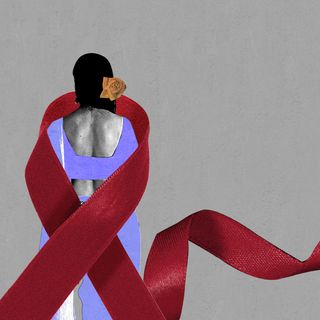
‘Rape Is Rape,’ Even If the Man Is the Husband: Karnataka HC
The marital rape exemption leads to women being “treated as a subordinate to the husband, which concept abhors equality,” the court said.

The “institution of marriage does not confer, cannot confer and in my considered view, should not be construed to confer, any special male privilege or a license for unleashing of a brutal beast,” the Karnataka High Court noted in a judgment yesterday, condemning the fact that marital rape continues to be legal in India even in 2022.
Creating ripples of excitement among the public, the judgment added, “If [rape] is punishable to a man, it should be punishable to a man albeit, the man being a husband.”
At the moment, India remains one of 36 countries around the world where it’s not criminal for ahusband to rape his wife — almost as if marriage accords men the license to force themselves upon women. This controversial exception to the country’s rape laws has drawn much censure;
The resistance to penalizing rape in marriage remains a testament to the country’s patriarchal values, even though, in the words of Justice M. Nagaprasanna who presided over the present matter, said, “no exemption in law can be so absolute that it becomes a license for commission of crime against society.”
The Karnataka HC was ruling on the petition of a man accused of raping his wife; he also allegedly assaulted and sodomized her, harassed her for money, terminated her fetus through forced sex, and also sexually harassed their minor daughter. Then he pled to the court to quash the charges against him, relying on the argument that marital rape is legal in India.
The court, however, dismissed the petition, saying that his wife’s statements “would send a chilling effect on any human being reading the contents of it.” “The Constitution treats woman equal to man and considers marriage as an association of equals. The Constitution does not in any sense depict the woman to be subordinate to a man… Under the Constitution, the rights are equal; protection is also equal,” Justice Nagaprasanna noted.
Related on The Swaddle:
On Marital Rape, Minister of Women’s Development Says ‘Every Man Is Not a Rapist’
Condemning the inequality that seeps into the country’s legislation due to marital rape not being penalized, he added that “a woman being a woman is given certain status; a woman being a wife is given a different status. Likewise, a man being a man is punished for his acts; a man being a husband is exempted for his acts. It is this inequality that destroys the soul of the Constitution which is [the] Right to Equality.”
Data from the National Family Health Survey-5, conducted in 2019-21, suggests that one in every 25 women reported being subjected to sexual violence by their husbands. The number, which is already appalling, could actually be much higher as most cases go unreported. At this juncture, the judgment certainly seems laudable.
The court, however, didn’t strike down the law that prevents marital rape from being punishable. Justice Nagaprasanna noted that doing so would be the prerogative of the legislature.
As a result, experts are worried about the judgment’s value as a legal precedent. “It’s a nice liberal moment… The end result is laudable. The judge’s concern is laudable. But the order is unsustainable,” Rebecca John, a senior advocate who had recently acted as an amicus curiae to the Delhi HC on the matter of making marital rape illegal, opined on the present judgment. She explained that “so long as an absolute exception exists, till the time it is struck down either through a constitutional court or a legislative amendment, a judge can’t say I’m disregarding the absolute exception.”
The “absolute exception,” in question, refers to Exception 2 to Section 375 of the Indian Penal Code, 1860, which states, “Sexual intercourse or sexual acts by a man with his own wife, the wife not being under fifteen years of age, is not rape.” In 2017, the Supreme Court had raised the age bar from 15 to 18; but marital rape itself continues to remain legal.
Related on The Swaddle:
How Our Evolving Idea of Intimacy Led to the Decline of Suhaag Raat’s Cultural Importance
Notably, courts have begun to recognize the moral and legal fissures with the legality of marital rape. Last August, the Kerala HC had held that even if marital rape isn’t illegal in India, it can be a valid ground for claiming divorce since the act can be construed as “mental and physical cruelty.” The bench attempted to relieve the woman from a marriage, where she was forced to have sex even when she was sick and bed-ridden, or grieving her mother’s death, in the absence of laws that would permit her legal recourse. As with the survivor in the present case, she too had been forced to engage in sex in front of her daughter.
Last month, the Delhi high court reserved its judgment after concluding its hearings. Its decision could go either way, but for now, the present judgment appears to be the only ray of hope — however thin that may be.
The Delhi HC, too, had been hearing a petition to criminalize marital rape in India — even as it’s been dubbed it as a “propaganda raked up by leftist feminists… to demolish the institution of marriage.” In other words, patriarchal values and the holy structure of marriage make everything — even rape — permissible in India.
“While this order [is] unlikely to become a precedent that can be followed for cases in the future, it is perhaps possible for cases like this to highlight the absurdity of the marital rape exception, and strengthen the arguments for why it needs to be struck down,” Vakasha Sachdev, a lawyer, wrote in The Quint, adding that “as things stand [however], the exception remains part of the law, and is… a blot on gender justice in the country.”
Devrupa Rakshit is an Associate Editor at The Swaddle. She is a lawyer by education, a poet by accident, a painter by shaukh, and autistic by birth. You can find her on Instagram @devruparakshit.
Related


Why a Common Entrance Test for University Admissions May Harm Students
